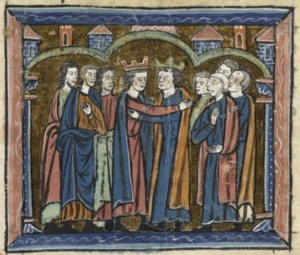Battle of Fréteval facts for kids
The Battle of Fréteval happened on July 3, 1194. It was a fight between King Richard the Lionheart of England and King Philip II of France. This battle was part of a bigger conflict that lasted for years. During the battle, Richard's Anglo-Norman and Angevin forces surprised the French army. Philip's army was defeated, and he had to run away. Richard captured Philip's important documents, which were his royal archives. After this, Philip decided to keep his archives in Paris. This decision led to the creation of France's national library, the Archives Nationales.
Why the Battle Happened
King Richard I of England was captured and put in prison in December 1192. This happened when he was returning from a crusade. He was held by Leopold of Austria. Richard was released in January 1194 after a huge ransom was paid.
While Richard was in prison, his brother, John, teamed up with the French King, Philip II. Philip also wanted to capture Richard. John gave Philip a lot of land from Richard's areas in Aquitaine. This included castles and land east of the River Seine.
Philip tried to take control of these lands while Richard was away. He had some success, especially near important Channel ports like Dieppe and Le Tréport. But as soon as Richard came back to Normandy, John made peace with him. John left Philip's side. Richard then started to win back the lands Philip had taken. He first ended Philip's siege of Verneuil on May 29, 1194. Philip had to quickly retreat and left behind his siege machines and other valuable equipment.
The Fight at Fréteval Wood
King Philip likely followed Richard's army as it moved through the Loire Valley. He wanted to limit what the English army could do. But Richard turned back on the French. In the chase, Richard's horse was killed. It's not clear if the two armies fully fought each other. Some people think only the back part of the French army fought the English.
This was more like a small fight, or "skirmish," which was common in wars back then. It was probably an ambush by the English. Philip seemed to leave his supplies and important items in a wood as Richard got close. Philip then escaped to a Saint-Hilaire chapel. A historian named John Gillingham said Philip's "sudden departure" made his troops lose hope. Richard then chased the retreating French soldiers. He later entered Verneuil as a winner. The fight at Fréteval was a "minor disaster" for Philip. This was more about politics than a big military loss.
Kings at that time often avoided large battles. This was because they traveled with their government and money. These were too important to lose in a fight. Philip's supplies included not just his personal things but also documents for government and collecting taxes. Among the French king's captured items were his personal seal and important archival papers. These included financial records, land documents, and tax receipts. A lot of treasure was also captured. One French writer said its value was "immense."
Philip quickly ran away across the River Epte. The bridge he crossed collapsed under his army's weight. This caused the French king to get soaked. One writer said Richard was "delighted" by this. Richard almost captured Philip. But he was too eager and rode past the chapel where Philip was hiding. This allowed Philip to escape.
What Happened Next
The captured documents reportedly gave Richard the names of all Philip's spies in Aquitaine. They also showed which Angevin soldiers had left Richard's side to join the French. At least one writer at the time enjoyed describing the French king's shame. In return, Philip attacked the town of Évreux. This town belonged to John, who had been Philip's ally. Philip also attacked local churches. French writers, not surprisingly, did not write much about Philip's defeat at Fréteval. One mentioned it in just one sentence. This was normal; small fights like Fréteval were often recorded only by the side that won.
Richard never went back to England. But he sent the captured French archives to London. They were stored in the Tower. Because of this battle, Philip became the first French king to stop carrying his archives with him during wars. Instead, he created the Trésor des Chartes in Paris. This was a new Chancery for keeping documents permanently. This was an important first step in keeping official government records.
 | Georgia Louise Harris Brown |
 | Julian Abele |
 | Norma Merrick Sklarek |
 | William Sidney Pittman |


